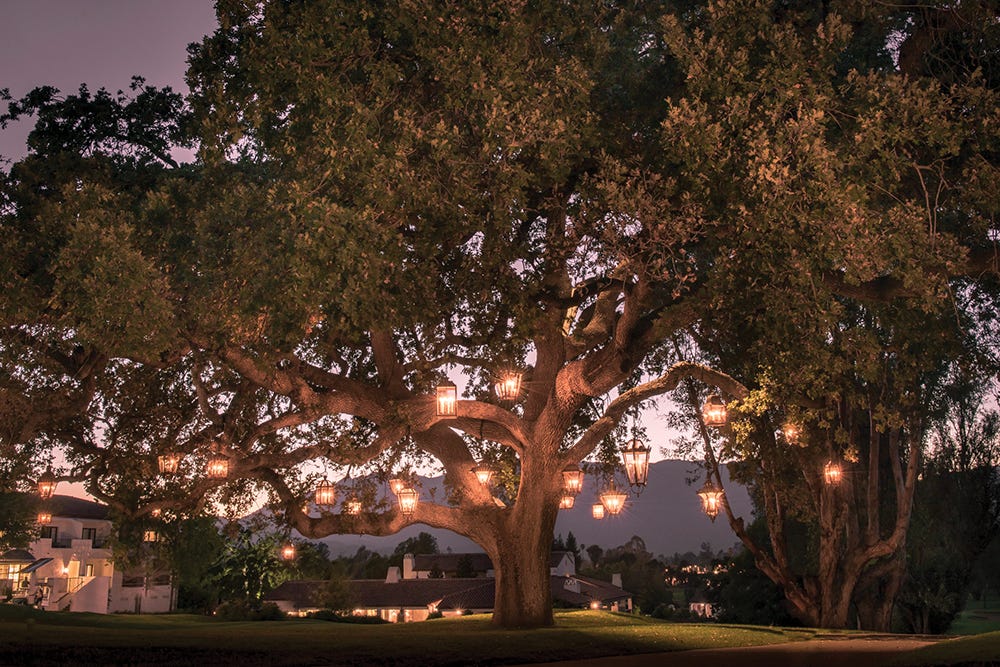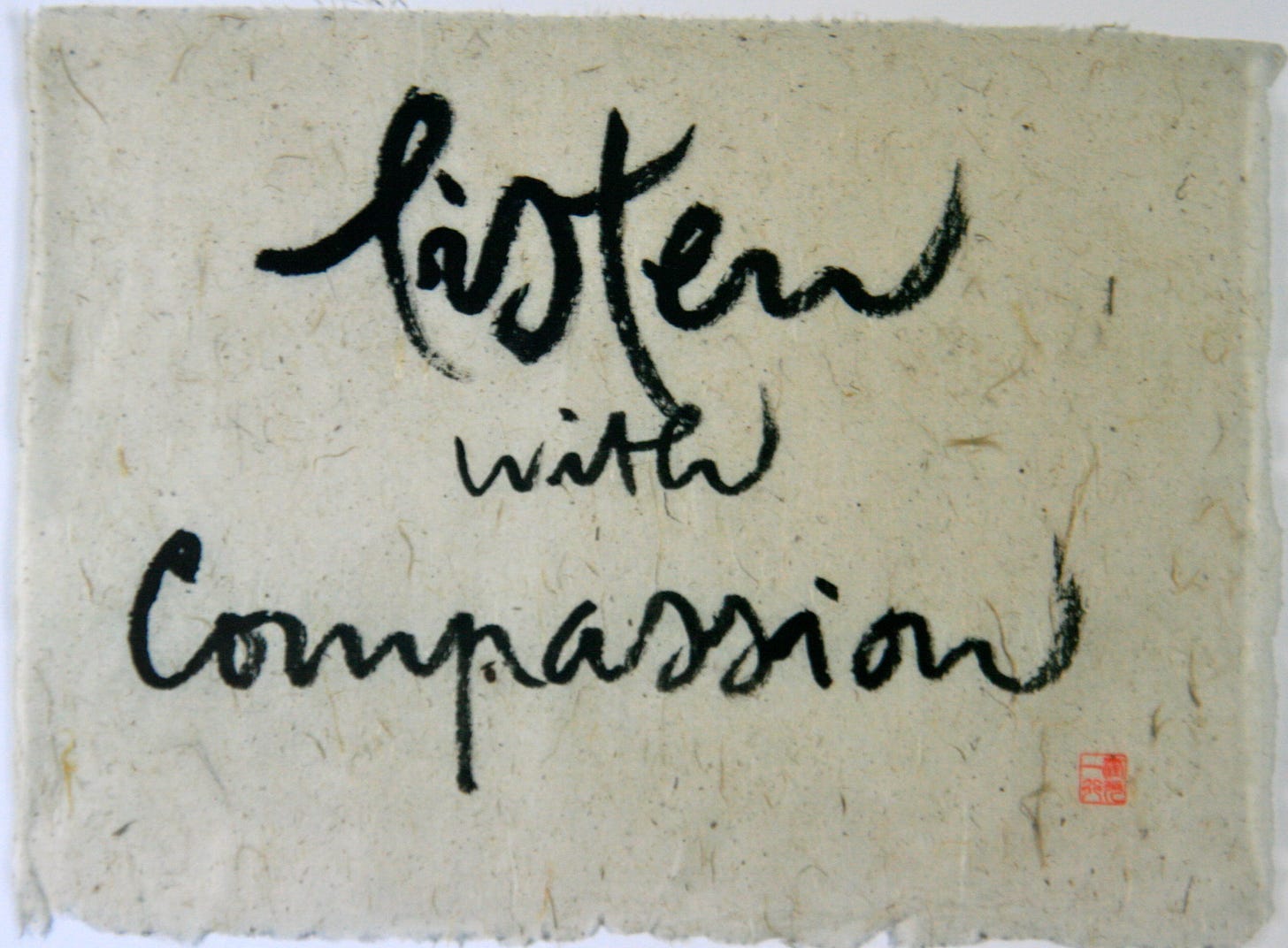The underappreciated art of listening
Q: How do you create space for others to be heard?
Mitali’s Dialogue
“I believe we can change the world if we start listening to one another. Simple honest conversations.”
In Oct 2019 I stood at a podium in front of two hundred people and this is how I started a two minute talk that I had scribbled together the night before. I was in Ojai Valley for a two day off-the-record, non-partisan meeting of innovative leaders from across the country. I had been invited to the event by a good friend who suggested I open up my horizons after I quit my job. The event brought people from diverse fields together to tackle the urgent questions of today. As I listened to the myriad of opinions shared around issues of human experience, I was struck by the importance of creating space for deep conversations - something that founders of this event had spent over 40 years crafting and perfecting.
One of the requirements for attending this event was that every participant had to give a two minute talk on any topic that they felt passionate about. I decided to talk about the “value of listening” and this is what I said that day -
I believe we can change the world if we start listening to one another. Simple honest conversations.
As the mom to a special needs boy with verbal apraxia - a speech delay that meant he did not learn to talk till he was three and a half years old - I have learnt the importance of giving everyone a voice. Taking the time to listen to them - compassionately, without judgment and with patience. My son struggled to get the words out of his mouth and I spent many years cobbling together what he was trying to communicate by slowing down and giving him my full attention.
Listen to learn.
Listen to connect.
Listen not to respond but to understand.
Be curious. Listen to show that you care about what the other person has to say.
Create a safe space for them to express themselves and be vulnerable.
I have strived every day to pause and listen to my son as he has grappled to find the words to describe his day. To make sure he is heard. To make sure he feels appreciated for who he is. He is not defined by his disability. While there have been difficult moments, I also view it as a gift to our family to learn how to slow down and be present.
So let us all strive to create an oasis for another human being -
To find the courage to discover their true self
To show them compassion for exposing their true self
And celebrate them for embracing their true self
Through the power of connection and conversation.
I am as passionate today about creating safe spaces for each of us to be heard and to be found as I was back in 2019. Last week I got a chance to go back to Boston for my 15-year business school reunion. While it was great to see so many old friends in person after two years of the pandemic, what I most cherished was the meaningful way we were able to connect through deep, honest and vulnerable conversations with each other.
One of the sessions I was excited about attending was called “Light Up The World: The New Science (and Serendipity) of Conversation” by Professor Allison Wood Brooks. I am sharing below some of the life hacks that she shared on how to become a better conversation partner. Here is a YouTube video of a similar talk by her.
I recently shared this podcast episode on relationships with a few friends - Why Do Marriages End? with Dr Mark Goulston. While the title is provocative, the lessons in the episode are universal. Dr Goulston talks about the value of empathy and listening in a relationship, why strong personalities may have a more difficult time with emotionally intimate relationships, and the power of feeling felt vs feeling understood.
My takeaways -
Create space for your partner to open up to you. Ask them - “Have I ever made you feel - not worth listening to, awful about yourself, or so lonely that you could feel it?”
Women often say ‘Don’t give me advice or solutions’ to their partners. It is because when they’re sharing something, they want to just feel less alone in the feeling, they want to feel felt by their partner, because if they feel felt, their oxytocin goes up, their cortisol goes down, their blood flow goes up to their brain, and then they can give themselves the advice they need. (I finally feel justified in there being a scientific explanation for what I have been saying to my husband for years 😀)
"...Consider your own experience, and you will likely find a direct correlation between the people you feel love you, and the people who actually listen to the things you say. The people who never ask us a thing are the people we drift away from. The people who listen so hard that they pull new things out of us – who hear things we didn’t even say – are the ones we grab on to for life."
- The Art of Listening, M M Owen
Kinnari’s Dialogue
“You never listen to me!” It was 8 pm on a Tuesday and my husband and I were in the middle of an argument. I was taken aback. This was something I usually said to him. I like to think of myself as a good listener, always curious about people's stories, always asking questions so it was a surprise to hear this from someone so dear to me. My immediate reaction was to respond defensively. I wanted to say - What do you mean I don’t listen? I always listen! But I held back. I looked at him and realized he was trying to communicate his feelings, something he rarely does. Instead of blurting out words that weren’t going to do either of us any good I said “Go on. Tell me more”
Listening is not the act of hearing the words spoken, it is the art of understanding the meaning behind those words. The art of listening is creating an environment in which the other person feels heard. I want to feel heard, seen, and understood.
- Simon Sinek
Listening is THE best way to build trust with someone. Too often though in our closest relationships we start taking each other for granted. After years of living with each other, we get into the mindset of “knowing” what the other person is going to say. Our minds start to fill in the gaps. I am working towards creating a ritual with my husband away from our daily grind where we are able to really listen and check in with each other.
At the start of a course (Navigating Midlife Transitions) I took with the Modern Elder Academy last year, we were introduced to the concept of “Appreciative Inquiry”. Replacing judgment with curiosity, asking each other open-ended questions that encouraged discovery. Questions that touch the heart, not just the head.
Here are The Five Basic Rules of Appreciative Inquiry to Be a Great Listener -
Ask open-ended questions
Create provocative questions to explore and imagine
Ask questions to flesh out details and additional ideas
Don't lead the witness (don't tell them your ideas)
Don't give advice
In his book “The Art of Communicating”, Thich Nhat Hanh (a well known Buddhist monk, teacher and peace activist) goes further and talks about how deep and compassionate listening can lead to lessening the suffering in others.
“You have to take the time to look and see the suffering in the other person. You must be prepared. Deep listening has only one purpose: to help others suffer less. Even if the person says wrong things, expresses bitterness, or blames, continue to listen compassionately for as long as you can. You may want to say this to yourself as a reminder: I am listening to this person with only one purpose: to give this person a chance to suffer less.”
What are you going to do today to help someone feel heard?
Links shared in this post -
How to Talk Gooder: The Science (and Serendipity) of Conversation by Allison Wood Brooks [YouTube video]
Why Do Marriages End? by Dr. Mark Goulston [podcast]
The Art of Listening by M M Owen [article]
Navigating Midlife Transitions by Modern Elder Academy [online course]
The Art of Communicating by Thich Nhat Hanh [book]






Another thoughtful and insightful post 💕 thank you both
Brilliant. So relevant in todays age of hyper distractions / constantly being connected. Slowing down / building deeper relationships with immediate family members, friends and colleagues.